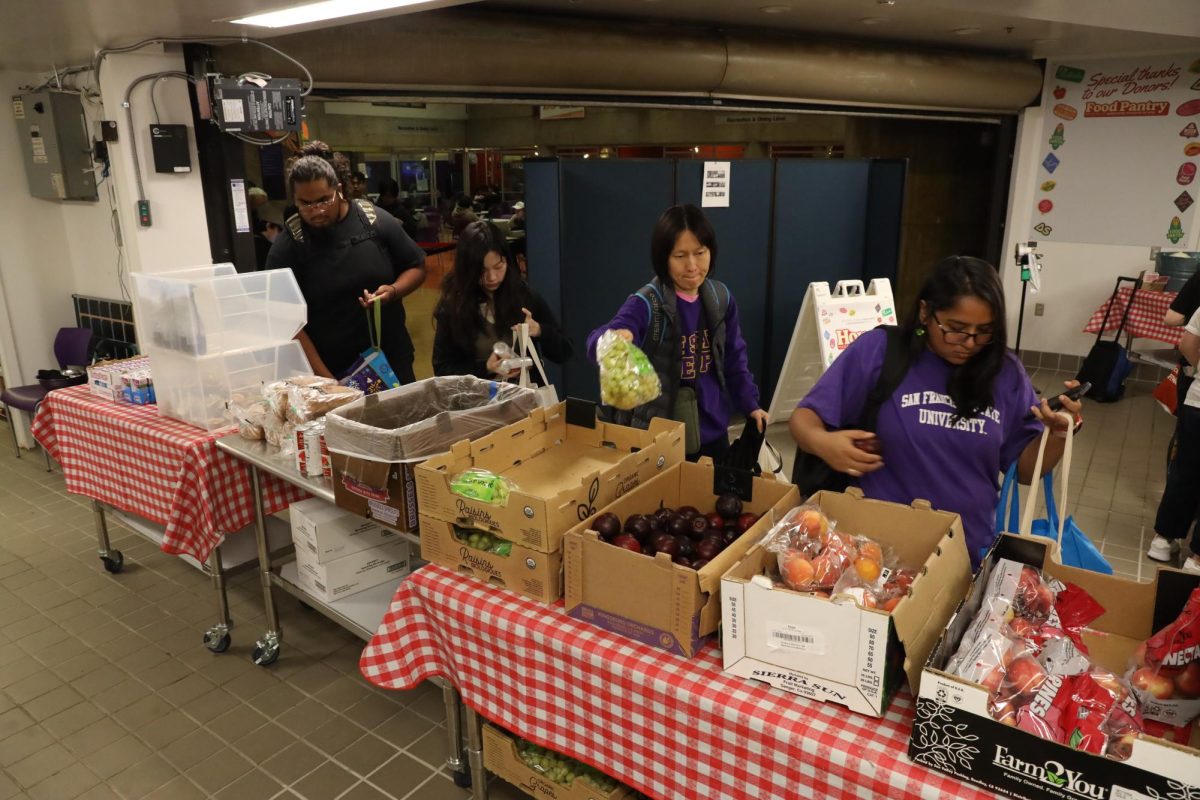California State University recently expanded the Basic Needs Initiatives across all 23 campuses, allowing SF State to establish a permanent food pantry and provide students with alternative housing resources.
SF State, as well as the other CSU campuses, have expanded their Basic Needs Initiatives, a program that focuses on providing resources for students to combat food insecurity and housing instability. Having stable sources of food and housing would help students reach their potential to thrive academically and maintain a balanced mental and physical state.

The CSU Office of the Chancellor conducted a study of student’s basic needs, co-authored by Principal Investigator of Long Beach State, Rashida M. Crutchfield, and Principal Investigator of Humboldt State, Jennifer Maguire. In the report including students across the CSU system, about 42% of CSU students reported food insecurity and 11% reported experiences of homelessness within the last year.
According to the study, the Chancellor’s Office created a financial opportunity known as the SB 85 Hunger-Free Campus grant, where funding helped address food and housing complications among students. SF State applied and was awarded funding in 2018.
“About 48% of SF State students reported dealing with food insecurity while 18% of SF State students reported dealing with homelessness in the last year,” Jewlee Gardner, interim assistant director for SF State’s Basic Needs Initiatives, said.
The Basic Needs Initiatives is placed within Health Promotion and Wellness in Student Affairs and Enrollment Management and works alongside Associated Students.
Major components of the university’s development to help students achieve their academic success are food resources such as the Gator Grub Alert, Be a Good Neighbor Feed a Gator and Gator Groceries programs.
The Gator Groceries program run by Associated Students launched a permanent food pantry space on campus on the bottom level of the Cesar Chavez Student Center on Sept. 4.
“450 students arrived at the opening and emptied our stock, and it took about two days to replenish,” Preyansh Kotecha, president and CEO of the Associated Students Board of Directors, said. “We ask students in surveys what type of goods they want and need and even provide recipe booklets so they know how to create meals with the food given.”
Instead of having to spend money and live off ramen and frozen foods, students are given the opportunity to receive healthy ingredients for free.
“I love it. Free food, no catch,” junior Stephen Silides said. “Teaching kids to cook by incentivizing them with free food is genius. This will help everyone down the road.”
The food pantry provides a variety of items multiple times a week from produce to non-perishables, depending on availability at local food banks.
“I really appreciate the access to expensive vegetables and not just junk food, and how they let students get what they need,” senior Jolie McCumber said.
McCumber learned about SF State’s food pantry and Gator Groceries program during her sophomore year and would go every month for three months before the school had a permanent location.
“It’s beneficial to those who are in need, it should be promoted more,” McCumber said. “There’s good food, great service and convenient location.”
Although many CSU campuses have food pantries or food distribution programs, SF State is the first campus with a permanent space on site. According to Kotecha, campuses such as Fresno State and San Diego State are looking at SF State to get help for permanent food pantry spaces to be created.
Multiple programs and projects under the Basic Needs Initiatives are in progress, such as forming a list of emergency shelter resources across the Bay Area and housing and food programs expecting to launch this fall.
SF State’s Basic Needs Initiatives is focusing on establishing programs such as the Basic Needs Hubs and Lounges, “helping students dealing with unstable housing situations and time-consuming commutes by recycling and advancing physical and financial resources on campus,” Gardner, director of the initiatives, said.
Some of these resources would include safe spaces to rest, showers and a secure space to store belongings, allowing students to attend to hygiene, store and heat food, charge devices, connect with basic needs programs and find community in a welcoming and dignified space.
The Crisis Housing Program is an emergency resource that would offer students who are experiencing unexpected housing problems a short-term stay in a unit on campus, which is expected to start this fall.
The Zen Den Safe Sleep Program, another one expected to launch in fall, would allow safe resting spaces on campus for students to use during the day. The sleep program would include two resting rooms, one located in the Mashouf Wellness Center for early mornings and the other in Student Health Services for the afternoon.
According to SF State’s Basic Needs Initiatives mission, resources for housing and food are a constant problem for San Francisco and a high-rated issue specifically for its students. It is difficult for students to reach their full academic potential and maintain a healthy well-being when basic needs such as food and housing are in jeopardy.
“Our student population has a wide variety, many are by themselves, lack family support and knowledge about resources that can relieve stress from their everyday life,” Kotecha said. “ All students need help.”














